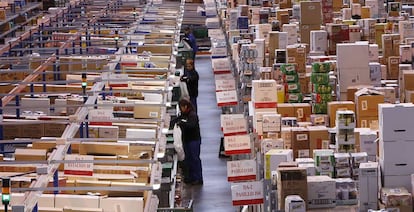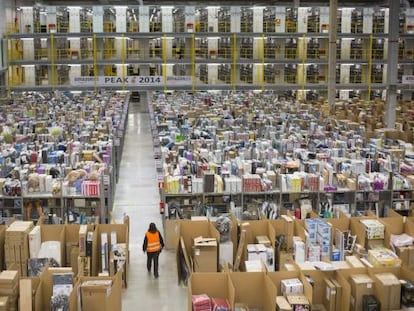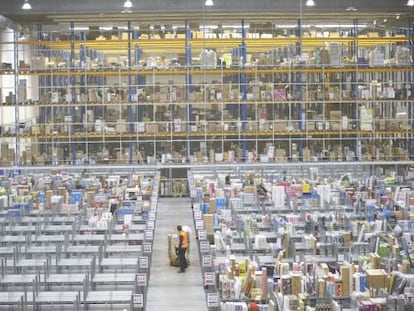The companies racing to be first in Spanish e-commerce delivery
Express shipping firms and logistics giants are vying against each other in a market with high growth potential

Immediacy became the key word in retail sales on the same day that the internet reduced the distance between manufacturers and buyers.
Logistics, the sector involved in delivering packages to clients, lives off customers’ clicks and taps. E-commerce is its main engine of growth, and also its main challenge. Every online purchase marks the beginning of a race against time.
Seur’s logistics center in Madrid is open day and night. It is synchronized with the time at which most Spaniards make their online purchases, starting at 6 or 7pm, when they get off work.
Spanish logistics company Seur already has its eye on the next new trend: fast food delivery
Around 400 employees run around frantically among piles of packages at the facilities of Spain’s leading express shipping company. Forklifts raise and lower large boxes that will be sent out north and south of the country. The northbound ones are placed in the right-hand side of the warehouse, the southbound ones in the left.
Conveyor belts with 68 exit doors carry packages at a speed of two meters per second. Manual and automated classifying systems using laser and photography analyze up to up to 28,000 items an hour. These packages will be delivered within 24 hours on average.
“If something or someone is not moving, it means something or someone is failing,” says an official in charge of directing all this traffic.
Sign up for our newsletter
EL PAÍS English Edition has launched a weekly newsletter. Sign up today to receive a selection of our best stories in your inbox every Saturday morning. For full details about how to subscribe, click here.
Seur has two major logistics centers in Madrid and Barcelona, and trucks drive out of them filled to capacity with goods. Most of these products have been purchased online.
“It used to be that our dialogue was with the manufacturing company, but now it’s with the final consumer,” explains Carlos Cavero Mestre, general director of logistics for Seur.
E-commerce in Spain is still below French or British levels, but it is on the rise. In the third quarter of last year – when the latest official figures are available – there were nearly 74 million online purchases, a 27.4% rise from the same period a year earlier. Music, books, newspapers, stationery and clothing lead the sales charts.
In this battle to head the sector, logistics companies are simultaneously allies and competitors of e-commerce giants such as Amazon, which are increasingly developing their own delivery mechanisms.
Conveyor belts with 68 exit doors carry packages at a speed of two meters per second
Such is the case with El Corte Inglés, Spain’s leading department store. In December, the company launched its own express delivery service that promises to have items at the door within two hours of purchase. More recently, customers are being allowed to select the exact time of delivery. The service is available in 27 Spanish cities.
Meanwhile, Amazon’s ambition is to reduce delivery times even further, down to about an hour. It has conducted trials in cities such as Milan, and is experimenting with drones.
The US company’s arrival in Spain in 2011 revolutionized the sector. Its enormous catalogue and speedy delivery times altered the classic parameters of retail commerce. Amazon is expanding its Madrid facilities, planning a new logistics center near Barcelona airport and renting out a building in the center of the Catalan capital for express downtown deliveries.
Seur, which has an agreement with Amazon, views e-commerce as an agent for growth. And it already has its eye on the next new trend: fast food delivery.
“This market is working really well in the US, and we feel that there is a large margin for growth in Spain,” says Pedro Gallego, corporate operations director for Seur. The company, he explains, has reached a deal with the JustEat application and plans to triple its driver crew in order to deliver food within a maximum timeframe of 40 minutes. “And using electric vehicles,” he adds.
English version by Susana Urra.
Tu suscripción se está usando en otro dispositivo
¿Quieres añadir otro usuario a tu suscripción?
Si continúas leyendo en este dispositivo, no se podrá leer en el otro.
FlechaTu suscripción se está usando en otro dispositivo y solo puedes acceder a EL PAÍS desde un dispositivo a la vez.
Si quieres compartir tu cuenta, cambia tu suscripción a la modalidad Premium, así podrás añadir otro usuario. Cada uno accederá con su propia cuenta de email, lo que os permitirá personalizar vuestra experiencia en EL PAÍS.
¿Tienes una suscripción de empresa? Accede aquí para contratar más cuentas.
En el caso de no saber quién está usando tu cuenta, te recomendamos cambiar tu contraseña aquí.
Si decides continuar compartiendo tu cuenta, este mensaje se mostrará en tu dispositivo y en el de la otra persona que está usando tu cuenta de forma indefinida, afectando a tu experiencia de lectura. Puedes consultar aquí los términos y condiciones de la suscripción digital.

